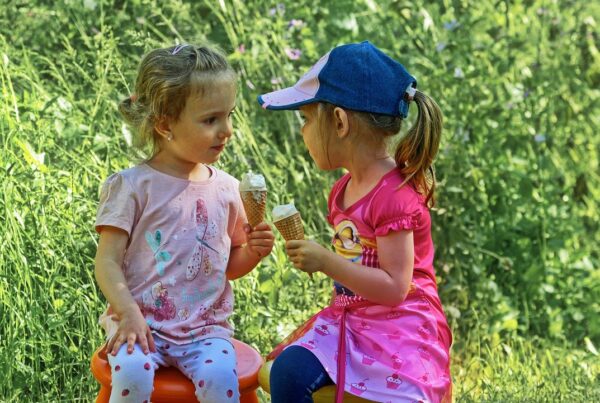Written by: Crystal Williams, Ph.D.
An inclusive summer camp is designed for children with and without disabilities, allowing students with diverse needs and abilities to interact and learn from/with one another. This approach differs from summer camps that are exclusively designed FOR children with disabilities or those that EXCLUDE children with disabilities. According to a joint statement from the Division for Early Childhood and the National Association for the Education of Young Children (2009), inclusion encompasses three components: access, participation, and support. Therefore, an inclusive summer camp goes beyond letting children with disabilities attend; it provides meaningful opportunities for all children to participate in camp activities with individualized support.
High-quality inclusion has benefits for both children with and without disabilities, as well as our society as a whole (Graham, 2019; Roldán et al., 2021)! There are many benefits of inclusive summer camps (Koegel et al., 2019; Arbour-Nicitopoulos, 2018; Villani, 2024), which can include:
- Children with and without disabilities gain skills, such as:
- friendship and social skills
- collaboration and teaming
- self-esteem and confidence
- leadership
- problem-solving
- empathy
- independence
- Children develop inclusive attitudes and respect for all types of diversity including race, culture, language, ability, and class
- Inclusive camps can have a ripple effect, whereby campers and staff take back inclusive values and initiatives to their communities, which helps create a more inclusive society
Things to consider when looking for an inclusive summer camp:
- Parents of individuals with disabilities and/or disabled activists help design, organize, and govern the inclusive camp
- The camp has a non-exclusionary discipline policy
- Children with and without disabilities do activities together
- Children without disabilities are not assigned responsibility over children with disabilities, including being regarded as “role models” or “mentors”
- Camp staff have high expectations for all children, respect the autonomy and boundaries of children with disabilities, and do not assume deficits nor have savior mentalities regarding children with disabilities
- The environment is physically accessible
- All children can access supports that promote their inclusion and participation (e.g., adaptive equipment, visual supports, augmented alternative communication, interpretation services, sensory regulation supports)
- Camp staff receive ongoing training related to supporting children with a wide range of support needs and abilities
- Camp staff represent diverse backgrounds and perspectives
To find camps that meet your preferences and your child’s interests and needs:
- Try searching on the American Camp Association
- Check local chapters of major disability organizations (e.g., The Arc, Easter Seals)
References
A Symphony of Differences: The power of inclusion at summer camp. (2023, June 27). CoolJobs.com.
Arbour-Nicitopoulos, K. P., Grassmann, V., Orr, K., McPherson, A. C., Faulkner, G. E., & Wright, F. V. (2018). A scoping review of inclusive out-of-school time physical activity programs for children and youth with physical disabilities. Adapted Physical Activity Quarterly, 35(1), 111-138.
Molina Roldán S, Marauri J, Aubert A, Flecha R. (2021). How inclusive interactive learning environments benefit students without special needs. Frontiers in Psychology, 29 (12), 661427, 1-12.
Graham, Linda. (2019). Inclusive education for the 21st century: Theory, policy, and practice. Allen & Unwin.
Koegel, L. K., Glugatch, L. B., Koegel, R. L. & Castellon, F. A. (2019). Targeting IEP social goals for children with autism in an inclusive summer camp. Journal of Autism and Developmental Disorders 49, 2426–2436.
Villani, Emily, “Fostering Friendship and Acceptance in an Inclusive Summer Day Camp” (2024). Electronic Thesis and Dissertation Repository. 9979.
Image Credit: Rawpixel.com, CC0












